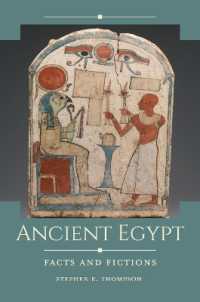- ホーム
- > 洋書
- > 英文書
- > Philosophy
Full Description
This is a major reinterpretation of ancient philosophy that recovers the long Greek and Roman tradition of philosophy as a complete way of life--and not simply an intellectual discipline. Distinguished philosopher John Cooper traces how, for many ancient thinkers, philosophy was not just to be studied or even used to solve particular practical problems. Rather, philosophy--not just ethics but even logic and physical theory--was literally to be lived. Yet there was great disagreement about how to live philosophically: philosophy was not one but many, mutually opposed, ways of life. Examining this tradition from its establishment by Socrates in the fifth century BCE through Plotinus in the third century CE and the eclipse of pagan philosophy by Christianity, Pursuits of Wisdom examines six central philosophies of living--Socratic, Aristotelian, Stoic, Epicurean, Skeptic, and the Platonist life of late antiquity. The book describes the shared assumptions that allowed these thinkers to conceive of their philosophies as ways of life, as well as the distinctive ideas that led them to widely different conclusions about the best human life.
Clearing up many common misperceptions and simplifications, Cooper explains in detail the Socratic devotion to philosophical discussion about human nature, human life, and human good; the Aristotelian focus on the true place of humans within the total system of the natural world; the Stoic commitment to dutifully accepting Zeus's plans; the Epicurean pursuit of pleasure through tranquil activities that exercise perception, thought, and feeling; the Skeptical eschewal of all critical reasoning in forming their beliefs; and, finally, the late Platonist emphasis on spiritual concerns and the eternal realm of Being. Pursuits of Wisdom is essential reading for anyone interested in understanding what the great philosophers of antiquity thought was the true purpose of philosophy--and of life.
Contents
Preface ix Chapter 1 Introduction: On Philosophy as a Way of Life 1 1.Philosophy Ancient, Modern, and Contemporary 1 Chapter 2. What It Means to Live a Philosophy 17 2The Socratic Way of Life 24 1.Ancient Philosophy as Intellectual Pursuit vs. as Way of Life 24 2.Socrates in Plato's Apology 32 3.Socratic Dialectic, Socratic Knowledge, and Human Wisdom 42 4.Socratic Philosophy as a Way of Life 48 5.Socrates and the Subsequent Tradition 60 Chapter 3 Aristotle: Philosophy as Two Ways of Life 70 1.Introduction 70 2.Practical vs. Theoretical Knowledge 74 3.The Highest Good, Happiness, and Virtue 79 4.Two Happy Lives, Two Happinesses: The Contemplative and the Practically Active Lives 91 5.Theoretical vs. Practical Virtue as Highest Good 96 6.The Practical Virtues: General Account 99 7.The Specific Practical Virtues 105 8.Practical Knowledge and Ethical "Theory" 117 9.Political Community and the Highest Good 123 10.Conclusion: Philosophy as Two Ways of Life 137 Chapter 4 Stoicism as a Way of Life 144 1.Introduction: The Three Hellenistic Philosophies 144 2.Stoicism: Tradition and Texts 147 3.Stoic Eudaimonism 150 4.Stoic Moral Psychology and the Human Virtues 158 5.Virtue: Agreement with the World-Mind's Plans 166 6.What Is Good vs. What Is Merely of Some Value 184 7.Consequences of the Stoic Theory of Value 190 8.Stoic vs. Aristotelian Conceptions of Emotions or Passions 203 9.The Stoic Way of Life 214 Chapter 5 The Epicurean and Skeptic Ways of Life 226 1.Introduction 226 2.Epicurus's Theory of the Human Good: "Kinetic" and "Katastematic" Pleasure 229 3.The Epicurean Way of Life: Virtue, Irreligion, Friendship 246 4.The Epicurean Life: Concluding Summary 271 5.Ancient Skepticism: Living without Believing Anything 276 6.The Pyrrhonian Skepticism of Sextus Empiricus 282 7.The Skeptic Way of Life 291 Chapter 6 Platonism as a Way of Life 305 1.Introduction: Pythagoras, Plato, and Ancient Greek Wisdom 305 2.Plotinus's Platonist Metaphysics 317 3.Plotinus's Theory of the Human Person 326 4.Three Levels of Human Virtues: "Civic", "Purifying," and "Intellectual" 341 5.Virtue and Happiness 363 6.Philosophy: The Sole Way Up to Life Itself 381 7.Epilogue: The Demise of Pagan Philosophy, and of Philosophy as a Way of Life 383 Further Readings 389 Endnotes 401 Bibliography 425 Index 431








